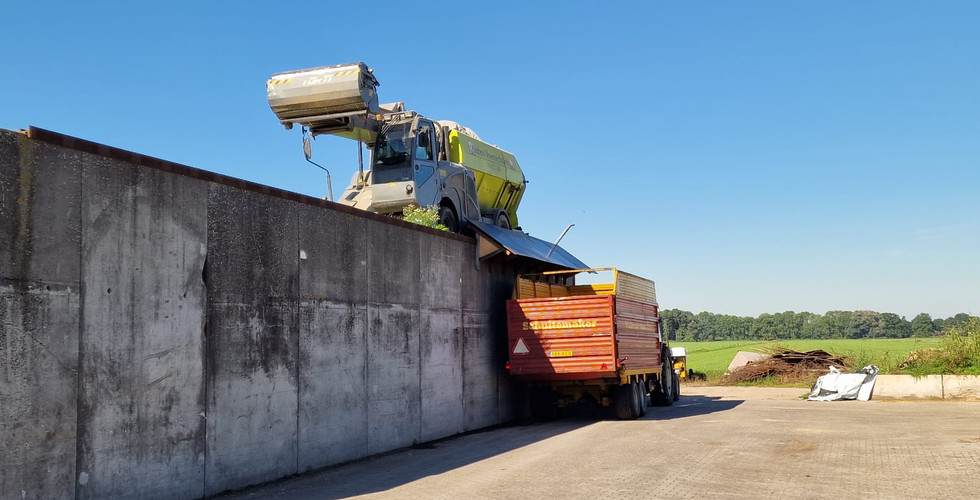September 2023 Club Tour to Netherlands
- Irish Pure Friesian Club

- Oct 4, 2023
- 4 min read
Updated: Oct 9, 2023
Three busy days visiting ten varied sites.
In September ten of the club visited the Utrecht area of the Netherlands and gathered a wealth of insights from the knowledgeable and open farmers and reps they met in a jam packed three days. The weather was extremely hot and dry causing shade to become a valuable commodity.

The tour guide was Bart Peek, feed adviser at ABZ De Samenwerking and also works on his home farm. Bart had spent time as a student working with Bill O'Keeffe's Churchclara herd and showed Churchclara cows and calves at Iverk a few years ago. He and Bill organised every detail of the tour and the logistics and itinerary were incredible.

There was of course plenty of discussion of EU and Dutch agricultural policy. The first stop was a talk by Bart at his feed company on nitrogen and Natura areas legislation in particular. The scale of Dutch agricultural output was made clear in the slide below. The level of production for both domestic and exported demand is being put under increasing pressure by emissions and habitat legislations.

But the accepted or expected version of nature is under discussion. Dutch farmers, as seen in their recent protests and creation of a new political party, are frustrated and feel their practices and contributions to nature and food production are being targeted in a drive towards an environmental ideal which may have unintended consequences.

The touring group noticed a lack of hedgerows in the area they visited, but rather than ever being removed, it is more likely they never existed and it has to be acknowledged that rewilding in the Netherlands could mean returning to sand dunes - or sea. As Bart says "You have to remember that every bit of the Netherlands is turned, all the nature is created, for example al the heather is created by using peat, sand was underneath and that became Dutch nature."
In the Netherlands we have to use all the space because there are so many people. I don't think creating more nature will help us. I think we should also view agricultural land more as nature. The Netherlands, for example, is known for meadow birds, many farmers have meadows that they will mow later in the season to allow the birds to breed. We look for them and mow around them. Many of them are eaten by storks and foxes that we are not allowed to shoot. We as farmers are then blamed for the decline in numbers. And that generally becomes a problem: hunters kept populations at healthy numbers, but every year they are allowed to shoot less. Now, for example, the numbers of certain animals, such as hares and geese, are exploding at the expense of other species.
Some of the observations the group made following the intense trip noted the efficiency of the farms visited. This included the quality of their silage, the milk solids being produced in terms of litres and percentages, all farms had solar panels, every farm is using LESS since 1993. This efficiency extended to their attitude towards slurry. As one of the group writes "For me the standout part was the value the Dutch have for slurry and the enormous lengths they go to maximise its potential effectiveness. On all the roads we travelled the grassland management was on a class of its own, superbly maintained with manicured farmyards. You would have to pay good attention to find a weed growing or the odd bit of hedgerow dotted here and there. Letting the cows out for 6 hours a day after a 4 course TMR seemed like more of a nuisance to the farmer than leaving them inside where I have to admit they were extremely happy and content. I would love to know the production costs per litre and compare but I have to admire how incredibly interested the younger generation are of continuing the great Dutch legacy of farming against increasing and incredible odds "
Another takeaway from the trip was the tidiness and automation in farm yards. Automation was a huge feature. Robot milking, feeding, scraping, zero-grazing, pit covers automated at Barts farm. Heat detection aids, etc. Echoing this, another comment was "The money spent on farm yards, paving bricks ,red bricks on all “barns” sheds."
The tourists were treated to incredible hospitality by Bart and his family with a welcome barbecue on the first night. Bart was an exceptional tour guide and the club benefitted from his relationships with clients and others as he found farms of interest to visit - including a herd of milking buffalo using robots. (See the slideshow of pictures above).
From a breed point of view, it was obvious from the lack of pedigree Dutch Friesian herds available to visit that numbers have been affected over the decades of policy change and production increases. The challenges faced by Dutch farmers and their embrace of automation were important considerations for the touring farmers returning to their own farms. No system is perfect, and there is comfort in the familiar. Perhaps some more automation might help some of the labour related challenges both Dutch and Irish farmers share, but the costs discussed on the tour are significant, and rarely one-off costs!
Overall this was an informative and useful tour. Major thanks are due to Bill O'Keeffe and Bart Peek for their hard work and care in organising the tour and delivering everyone home safe & sound.
Further outings planned for the future.
























Comments